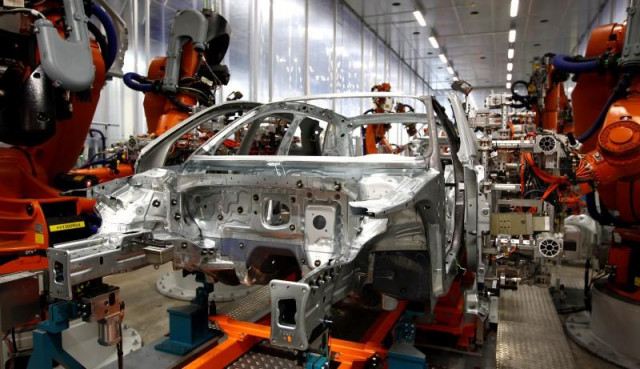Auto part makers concerned over rupee’s strength - and its weakness
Say uncertainty source of concern, look set to pass on burden to consumers

A car manufacturering plant. PHOTO: REUTERS
A glimpse of it was on show in July when the stock market, bankers and policymakers went in a state of frenzy looking at their trade screens. The rupee lost 3.2% overnight, but was pulled back to its ‘more acceptable’ state the next day. The development, however, still sent shivers down businesses’ spines.
Proposal to allow rupee depreciation opposed by Dar
Auto part manufacturers are no different. They bank heavily on imports that would become expensive if the rupee were to lose value. While some feel the effect will not be an issue - the argument being that they will just pass on the cost to the consumer - some feel the industry is also likely to take a short-term hit.
More than this, it’s the uncertainty that is bothering industry players.
“Rupee devaluation will affect all auto part manufacturers and their business cycles - this is a cause for concern,” said Pakistan Association of Automotive Parts & Accessories Manufacturers (Paapam) Chairman Mashood Ali Khan.
Auto vendors provide different parts to Original Equipment Manufacturers (OEMs) like Pak Suzuki, Indus Motor and Honda Atlas, but since their business cycle is generally longer they fear shrinking profit margins in the long run if the rupee loses value.
“I fear auto companies would hold my payment for a few months in case the rupee depreciates suddenly. This can stretch up to six to eight months,” an auto vendor informed this correspondent on condition of anonymity.
The industry estimates that auto vendors import close to 50% of their raw material that mainly consist of different kinds of plastics and steels.
Rupee sinks 3.2% against US dollar, Dar and SBP divided over explanation
“Rupee devaluation will hurt auto vendors just like it would hurt any other industry. All we want is that the rupee is allowed to depreciate gradually and not by a huge margin overnight,” former Paapam chairman Munir K. Bana commented.
Auto vendors expect that the government will eventually have to allow rupee depreciation in December 2017. Some believe the government will keep it within 10%.
“Rupee devaluation will certainly make everything expensive, including cars,” added Bana.
Some industry officials say an increase of 10% is not enough to deter automobile consumers from buying cars, since the demand tends to be price inelastic to an extent.
Why the concern over the rupee
The worry over Pakistan’s currency is not baseless. It stems from dwindling foreign exchange reserves, widening trade and current account deficits, and an ever-increasing debt pile.
Pakistan’ current account deficit widened by 102% in the first two months (Jul-Aug) of fiscal year 2017-18 (FY18), and stands at $2.6 billion compared to $1.29 billion in the same period of the previous fiscal year.
As a percentage of GDP, the deficit rose to 4.6% in the first two months of FY18 as opposed to just 2.5%.
Pakistan already posted a much higher-than-expected deficit of $12.1 billion (4% of gross domestic product - GDP) in the previous fiscal year ended June 30, 2017.
International lenders believe that the deficit is set to rise and it would require some measures on part of the government to control the gap.
Analysts say some of the measures the government could take immediately include rupee devaluation, levy of regulatory duty on non-essential imports, export promotion, floating dollar bonds and bilateral borrowing.
Regardless, it’s an uncertain time for businesses and one can only wait to see what happens to the rupee - and when.
Published in The Express Tribune, September 29th, 2017.
Like Business on Facebook, follow @TribuneBiz on Twitter to stay informed and join in the conversation.



















COMMENTS
Comments are moderated and generally will be posted if they are on-topic and not abusive.
For more information, please see our Comments FAQ